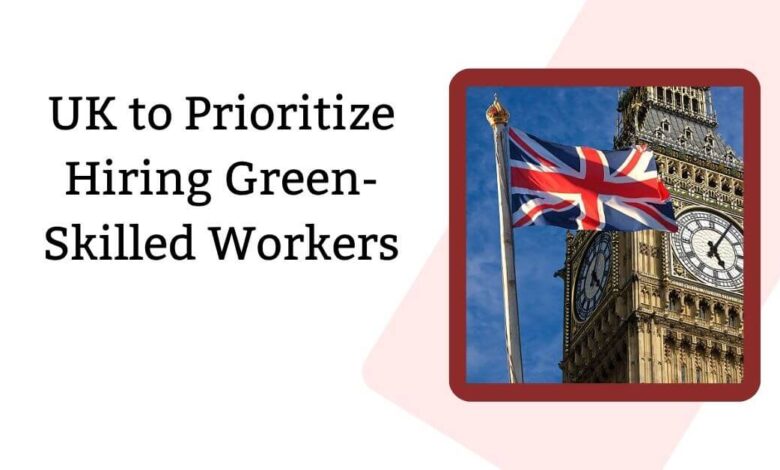UK to Prioritize Hiring Green-Skilled Workers 2026

A thorough new analysis released by the University College of Estate Management (UCEM) has raised the alarm about one of the nation’s most pressing labor crises: the green skills gap. This groundbreaking discovery has the potential to completely reshape the future of employment in Britain. According to UCEM’s results, if the UK is to fulfill its constitutionally mandated Net Zero aim by 2050, it must immediately increase the employment and training of green-skilled workers.
What’s Really Going On?
The UK faces a formidable obstacle as it moves closer to its legally mandated Net Zero target: a shortage of green skills. Over the last five years, green occupations have increased by 8% yearly, but the talent pool has only increased by 6%. Over 200,000 workers are currently missing, and the number is still growing.
A green talent makeover is especially needed in the built environment sector, which is responsible for an astounding 40% of the carbon emissions in the UK. The nation is preparing for a revolution in hiring in the fields of waste management, energy efficiency, design, construction, and surveying, with over 400,000 sustainability-related jobs anticipated to arise.
Why Does the Green Skills Gap Matter?
Because neither regulation nor climate change is waiting. UK businesses today face severe penalties for failing to go green due to ESG (environmental, social, and governance) compliance and tougher emissions legislation. As a result, they want qualified experts who can assist them in changing their operations.
It’s not only a technical problem. The disparity encompasses both technical skills (such as waste management, energy modeling, and carbon auditing) and soft skills (such as systems thinking, leadership, and communication). A visionary and a doer are essential to every sustainability endeavor.
15 Green Skills UK Will Be More Concerned in Near Future:
Want to ride this green wave? Master these in-demand skills:
- Carbon foot-printing & auditing
- Retrofitting & green construction
- Digital design tools (energy modeling, parametric design)
- Sustainability literacy & ESG compliance
- Waste management & recycling systems
- Adaptable thinking & problem-solving
- Cultural change facilitation
- Climate-conscious leadership
- Energy efficiency technologies
- Innovative building techniques
- Monitoring & impact analysis
- Green communication strategies
- Shared accountability modeling
- Critical thinking for sustainability
- AI & data use for environmental optimization
Scientists and engineers are not the only people on this list. It is also intended for data analysts, HR managers, business strategists, and marketers. Everyone who wants to improve their skills can find a place in the cross-disciplinary field of green.
Who’s Hiring Green?
Green talents are required in every industry, from local governments to real estate developers, internet firms, and transportation hubs. To prepare for the future, banks and supermarkets are now employing sustainability specialists.
£165 million has been made available by the UK government for new apprenticeship programs, local bootcamps, and training in green skills. And that’s only the beginning.
A quarter of a million of the more than 937,000 additional construction workers who will be required by 2032 must be apprentices with an awareness of sustainability.
Why You Can’t Afford to Ignore These Findings?
Still think green jobs are just a passing trend? Think again.
Ignore them now, and you risk being locked out of the future workforce.
Green skills are becoming the standard, not the specialty.
Industries that don’t go green?
They’ll crumble under the weight of climate policies and public pressure.
You could be the link between your current career and the booming sustainability economy.
This isn’t about starting over it’s about future-proofing your skills.
Additionally, having green talents can open up new economic mobility for women, members of ethnic minorities, and members of the working class. Opportunity is knocking loudly as employers are being challenged to broaden their green employment horizons and diversify.
Read Also: Kitchen Helper Jobs in UK Visa Sponsorship
Requirement for UK to Prioritize Hiring Green-Skilled Workers:
The green economy is beckoning regardless of your professional stage, whether you are a student, seasoned professional, or mid-career explorer. This is how to respond:
1. Get Certified
Enroll in degrees in sustainable built environments, sustainability certificates, or green skills courses.
2. Upskill on the Job
Inquire with your workplace for sustainability or ESG (environmental, social, and governance) training. Take initiative; it will be rewarded.
3. Switch Sectors
Every industry is changing, so apply your present skill set to a green transition position in tech, energy, construction, or finance.
4. Target the Right Employers
Seek out businesses that have proven sustainability. Consider net-zero pledges, B Corps, or high ESG ratings.
5. Promote Green Projects
Encourage sustainability in the workplace. Take the lead in energy-saving projects, recycling programs, or green team activities to demonstrate your commitment to the future.
More Info
- The UK’s Green Skills Gap – UCEM
- UN Sustainable Development Goals
- UK Needs 200,000 Green Workers IEMA
- Green Jobs Taskforce Report
- Green Education, Training, and Employment – UK Parliament
- Green Skills in Local Authorities CIPFA
Conclusion:
The UK’s drive for Net Zero is a workforce transformation as well as a climate imperative. The demand and supply of green-skilled workers, particularly in the built environment industry, are clearly out of sync, according to the UCEM analysis. It is imperative that this gap be closed in order to ensure regulatory compliance, economic resiliency, and a sustainable future. The moment has come for everyone to adopt green skills and contribute to the solution, whether they are students, job seekers, or seasoned professionals. The green economy is now and not just coming.
Frequently Asked Questions
What is the green skills gap in UK?
The lack of people with the sustainability-related skills required to reach the UK’s net zero targets is known as the “green skills gap,” especially in high-emission industries like construction.
How serious is the green skills shortage?
According to UCEM, the UK is currently short over 200,000 trained green professionals, especially in the built environment sector, which contributes to over 40% of the country’s carbon emissions




